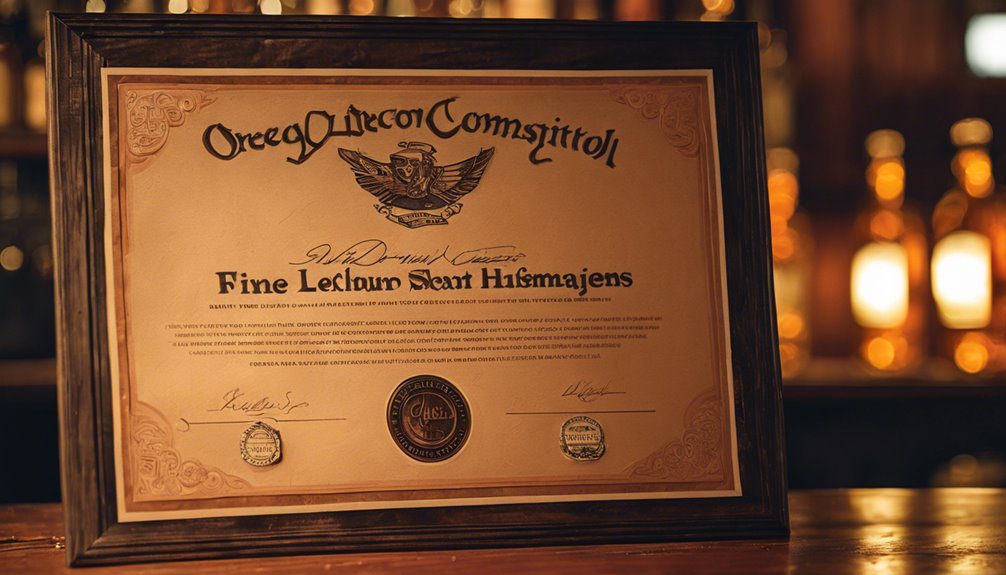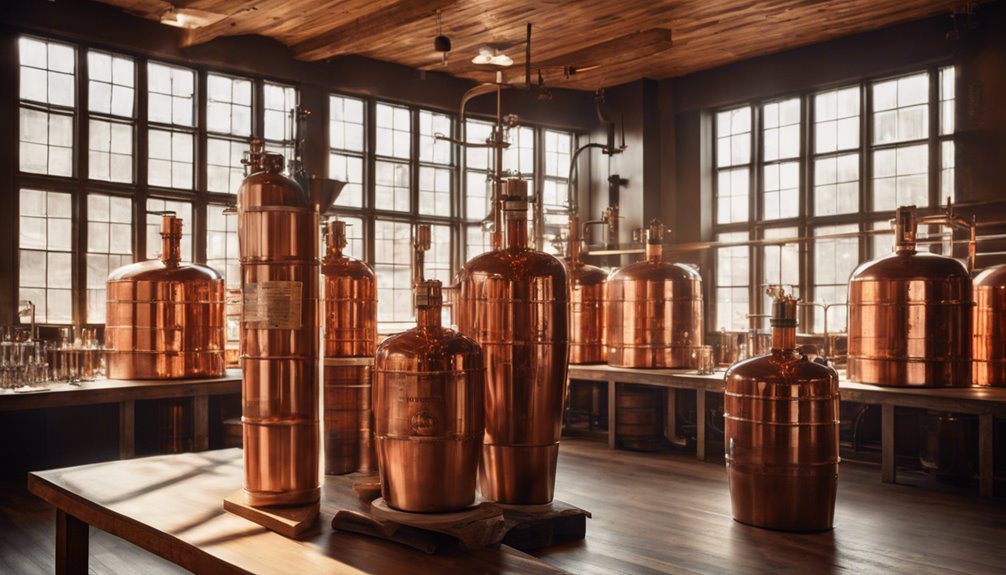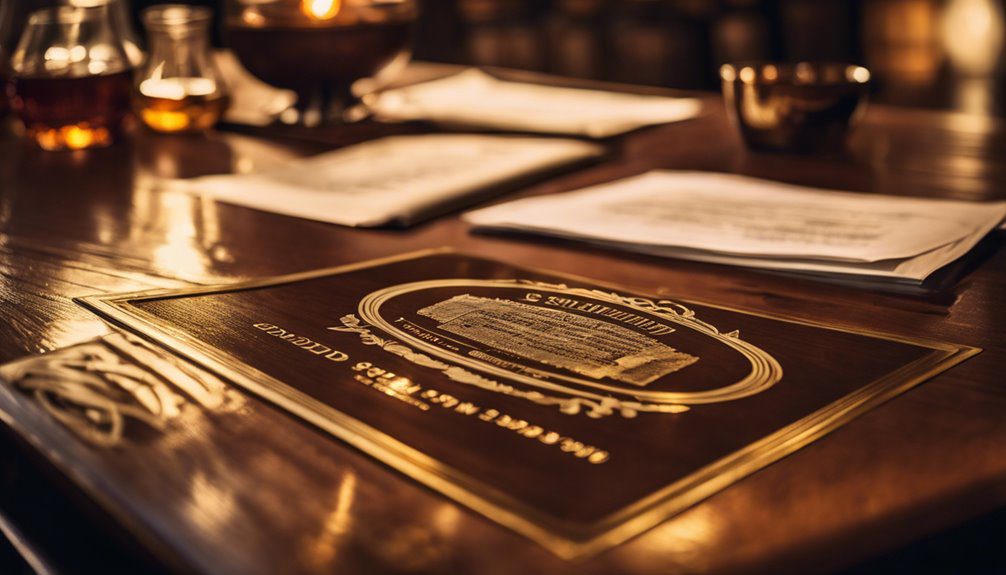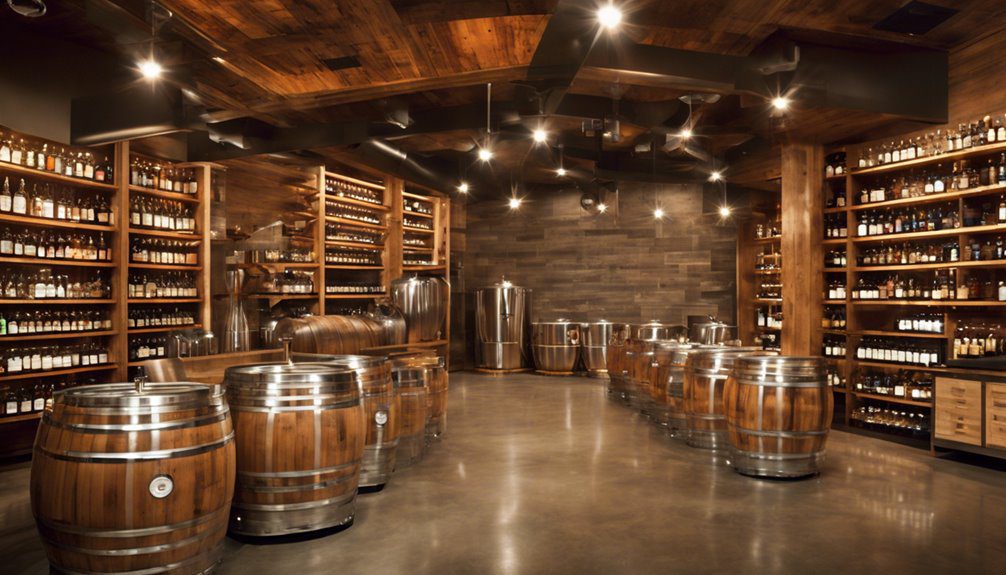When you're navigating the complexities of running a distillery in Oregon, understanding the Oregon Liquor Control Commission Licensee Bond is essential. This bond not only safeguards the public interest but also reflects your commitment to compliance with state regulations. It's a financial assurance that can affect your business's credibility and longevity. But what exactly does securing this bond entail, and how can it impact your operations? Let's explore the nuances that could shape your path forward in this highly regulated industry.
Overview of Licensee Bond

When you apply for a liquor license in Oregon, understanding the licensee bond is crucial to your success. This bond acts as a financial guarantee that you'll comply with state laws and regulations governing the sale of alcohol. Essentially, it protects the public and the state against any potential misconduct or violations that could arise from your operations.
A licensee bond is typically required for various types of liquor licenses, including those for distilleries, breweries, and bars. The amount of the bond can vary based on your specific license type and the scale of your business. By securing this bond, you're demonstrating your commitment to responsible practices in the alcohol industry.
If you fail to adhere to the rules, claims can be made against your bond, which may lead to financial repercussions. It's vital to work with a reputable bonding company that understands the specific requirements of the Oregon Liquor Control Commission. Alcohol bonds serve as a financial guarantee for adherence to state and federal regulations on alcohol, protecting consumers and ensuring the legal operations of businesses.
They can guide you through the process, ensuring you have the correct coverage and meet all necessary conditions. This proactive approach not only helps you obtain your license but also sets a solid foundation for your business.
Importance of the Bond
The licensee bond plays a pivotal role in the liquor licensing process in Oregon, serving as a safeguard for both the state and the public. By obtaining this bond, you demonstrate your commitment to operating within the law and adhering to the regulations set forth by the Oregon Liquor Control Commission.
It acts as a financial guarantee, ensuring that you'll fulfill any obligations related to taxes, fees, and legal responsibilities associated with your distillery. This bond not only protects the state but also builds trust with your customers and the community.
When you have a licensee bond, it signals to everyone that you're serious about compliance and ethical business practices. If you were to violate any regulations or laws, the bond provides a source of compensation for those affected, which can include financial penalties or restitution for damages.
Moreover, having a licensee bond can enhance your reputation in the industry. It shows that you're a responsible operator who values integrity and accountability. In the competitive world of distilling, this can give you a significant edge and help attract both customers and investors to your business. Additionally, the bond serves as a financial guarantee that reinforces your dedication to ethical conduct and lawful practices.
Eligibility Requirements

To qualify for a liquor license bond in Oregon, you'll need to meet several eligibility requirements set by the Oregon Liquor Control Commission.
First, you must be at least 21 years old and a resident of Oregon. This age requirement ensures that only responsible individuals can apply for a license related to alcohol sales.
Next, you must have a valid business entity registered in Oregon, such as a corporation or limited liability company. Your business should be in good standing, meaning it has met all state compliance requirements.
You'll also need to provide proof of financial stability, as the bond amount can vary based on your business operations.
Additionally, you should have no recent felony convictions or significant tax liabilities. A clean legal background is essential for maintaining public trust and ensuring compliance with state regulations.
Lastly, you might need to demonstrate that you have a suitable location for your distillery, along with the necessary permits and licenses to operate legally. Surety bonds are crucial in ensuring compliance and protecting against financial loss.
Meeting these eligibility requirements is crucial for a smooth application process.
Application Process
Navigating the application process for a liquor license bond in Oregon requires careful attention to detail. First, you'll need to gather all necessary documentation, including your business license, financial statements, and any relevant permits. Ensure that your information is accurate and up-to-date to avoid delays.
Next, you'll fill out the bond application form. This form typically asks for basic information about your distillery, such as its location and ownership structure. Take your time to review the application thoroughly; errors or omissions can lead to complications.
Once you've completed the form, you'll submit it along with your supporting documents to the Oregon Liquor Control Commission. Expect to pay a processing fee at this stage, though the specifics may vary.
After submission, your application will undergo a review process. Be prepared for potential follow-up questions or requests for additional information from the Commission. Staying responsive will help expedite your application.
After approval, you'll secure your bond, allowing you to operate legally. This diligent approach during the application process is crucial for a smooth and efficient experience. Additionally, surety bonds act as financial protection for the public against business malpractice, highlighting the importance of compliance throughout the process.
Cost of the Bond

After your application is approved, you'll need to consider the cost of securing your liquor license bond in Oregon. The bond amount typically ranges from $10,000 to $50,000, depending on various factors.
These factors include the type of license you're applying for and your business's financial stability.
You won't pay the full bond amount upfront. Instead, you'll pay a premium, usually a percentage of the total bond value. This percentage can vary based on your credit score and financial history.
If you have excellent credit, you might pay as little as 1% to 3% of the bond amount, while those with lower credit scores could face higher rates.
Additionally, it's essential to factor in any potential fees charged by the bonding company. These fees can influence the overall cost, so be sure to ask for a clear breakdown when you shop around for quotes.
Ultimately, budgeting for the bond is a crucial step in ensuring your distillery operations comply with Oregon's regulations. By understanding these costs, you can make informed decisions that support your business's success. Furthermore, securing a bond can provide financial assurance that protects both your business and local government interests.
Duration and Renewal
The duration of your liquor license bond in Oregon typically lasts for one year. This means you'll need to keep track of when your bond is set to expire to ensure uninterrupted compliance with state regulations.
It's crucial to renew your bond before it expires to avoid any potential issues with your distillery operations. Renewal is generally a straightforward process. You'll receive a notice from your surety company or bond provider, reminding you of the upcoming expiration date.
It's a good idea to review your bond terms and conditions during this time. If there have been any changes in your business or financial situation, you might need to discuss these with your surety provider to ensure your bond still meets the requirements.
When you renew, you might also want to compare rates and terms from different surety companies. This way, you can ensure you're getting the best deal possible.
Just remember, maintaining your bond in good standing is essential for your distillery to operate legally in Oregon, so stay proactive about the renewal process to avoid any lapses.
Compliance and Regulations

Keeping your liquor license bond up to date is just one part of the broader landscape of compliance and regulations you'll need to navigate while operating a distillery in Oregon.
You'll have to familiarize yourself with the Oregon Liquor Control Commission (OLCC) regulations, which govern everything from production to distribution.
First, ensure you're complying with zoning laws, as these can vary by city or county.
You'll need to secure the necessary permits and licenses before you start operations. It's crucial to submit your applications accurately and timely to avoid delays.
In addition, stay informed about health and safety standards, as they're vital for maintaining a safe production environment.
Regular inspections may occur, so be prepared to demonstrate that your facility meets all state requirements.
Also, keep track of labeling regulations for your products.
Accurate labeling not only prevents legal issues but also builds consumer trust.
Lastly, make sure your employees understand the legal requirements related to the sale and service of alcohol.
Providing regular training can help ensure everyone is on the same page and compliant with state laws. Additionally, maintaining your Weights and Measures Establishment Bond is essential to ensure accurate measurement in commercial transactions and protect consumers from fraud.
Consequences of Non-Compliance
Non-compliance with Oregon's liquor regulations can lead to serious repercussions that jeopardize your distillery's operations. You risk facing hefty fines, which can drain your financial resources and impact your bottom line.
Additionally, the Oregon Liquor Control Commission (OLCC) may suspend or even revoke your license, halting your ability to produce or sell alcohol altogether. This could result in significant losses and damage your reputation in the industry.
Moreover, if you fail to adhere to the regulations, you might find yourself liable for legal action from the state or even third parties. This could lead to costly litigation, further straining your finances and diverting your attention from running your business.
In extreme cases, non-compliance can lead to criminal charges, putting you and your business at serious risk. Your employees may also suffer, as job security becomes unstable in a non-compliant environment.
Ultimately, maintaining compliance isn't just about avoiding penalties; it's about ensuring the long-term success and sustainability of your distillery.
Prioritizing adherence to Oregon's liquor laws helps you cultivate a trustworthy brand and fosters positive relationships with regulators and customers alike.
Conclusion
In summary, securing the Oregon Liquor Control Commission Licensee Bond is essential for your distillery's success. It not only demonstrates your commitment to compliance but also builds trust with customers and regulators. By understanding the eligibility requirements, application process, and costs involved, you can ensure a smooth experience. Remember, maintaining this bond is crucial for avoiding potential consequences of non-compliance, so stay informed and proactive in your operations to foster a sustainable future for your business.


